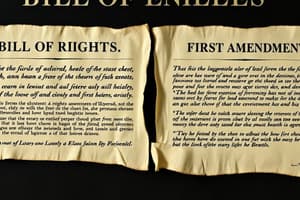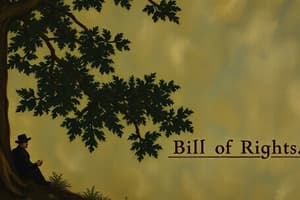Podcast
Questions and Answers
How did the Declaration of Independence influence the protection of civil liberties and rights in the United States?
How did the Declaration of Independence influence the protection of civil liberties and rights in the United States?
- It directly outlawed discriminatory practices in education and housing, setting a legal precedent for civil rights cases.
- It established specific legal freedoms that were immediately enforceable at the federal level.
- It granted the federal government the explicit power to intervene in state affairs to ensure equal treatment of all citizens.
- It served as a model for states to adopt their own constitutional protections for civil liberties and rights, inspired by its principles. (correct)
In the context of civil rights, what is the key legal principle that prohibits publicly-funded entities from discriminating against individuals?
In the context of civil rights, what is the key legal principle that prohibits publicly-funded entities from discriminating against individuals?
- The concept of 'affirmative action' which requires institutions to actively promote diversity.
- The principle of 'separate but equal' established in early court decisions.
- The doctrine of 'state sovereignty' which grants states exclusive power over civil rights issues.
- The guarantee of equal treatment and decision-making based on merit, as protected by the Constitution. (correct)
Which philosophical concept, championed by John Locke, heavily influenced Thomas Jefferson in drafting the Declaration of Independence?
Which philosophical concept, championed by John Locke, heavily influenced Thomas Jefferson in drafting the Declaration of Independence?
- The divine right of kings.
- The utilitarian principle of the greatest happiness for the greatest number.
- The idea of inalienable or natural rights that no ruler can deny. (correct)
- The social contract theory advocating for absolute monarchy.
How do debates around extended solitary confinement and capital punishment relate to civil liberties and rights?
How do debates around extended solitary confinement and capital punishment relate to civil liberties and rights?
What was the primary legal argument used to challenge and dismantle segregated schools in the United States during the 1960s and 1970s?
What was the primary legal argument used to challenge and dismantle segregated schools in the United States during the 1960s and 1970s?
Which scenario most accurately reflects the application of U.S. Constitutional protections to non-citizens?
Which scenario most accurately reflects the application of U.S. Constitutional protections to non-citizens?
How does the U.S. Constitution, specifically the Bill of Rights, primarily safeguard individual liberties?
How does the U.S. Constitution, specifically the Bill of Rights, primarily safeguard individual liberties?
What is the critical distinction between civil liberties and civil rights, as understood by legal experts?
What is the critical distinction between civil liberties and civil rights, as understood by legal experts?
In what way does the First Amendment protect religious freedom, and what are its limitations?
In what way does the First Amendment protect religious freedom, and what are its limitations?
What is the most accurate interpretation of the Eighth Amendment's prohibition against 'cruel and unusual punishments'?
What is the most accurate interpretation of the Eighth Amendment's prohibition against 'cruel and unusual punishments'?
How might the practice of religion be regulated without violating the First Amendment?
How might the practice of religion be regulated without violating the First Amendment?
Which action would most likely be considered a violation of an individual’s civil liberties as protected by the U.S. Constitution?
Which action would most likely be considered a violation of an individual’s civil liberties as protected by the U.S. Constitution?
What is the implication of the Constitution's use of the term 'persons' rather than 'citizens' regarding the protection of individual rights?
What is the implication of the Constitution's use of the term 'persons' rather than 'citizens' regarding the protection of individual rights?
Flashcards
Civil Rights
Civil Rights
Constitutional guarantees ensuring equal treatment by government officials, based on merit rather than personal characteristics.
Natural Rights
Natural Rights
The belief that individuals possess fundamental freedoms that cannot be denied by any ruler or government.
Inalienable Rights
Inalienable Rights
Rights so fundamental that they cannot be taken away or transferred.
Legal Indictment
Legal Indictment
Signup and view all the flashcards
"All men are created equal"
"All men are created equal"
Signup and view all the flashcards
Constitutional Protection
Constitutional Protection
Signup and view all the flashcards
Civil Liberties
Civil Liberties
Signup and view all the flashcards
Freedom of Religion
Freedom of Religion
Signup and view all the flashcards
Limits to Religious Practice
Limits to Religious Practice
Signup and view all the flashcards
Cruel and Unusual Punishment
Cruel and Unusual Punishment
Signup and view all the flashcards
Coverage of Rights
Coverage of Rights
Signup and view all the flashcards
Checks and Balances
Checks and Balances
Signup and view all the flashcards
Separation of Powers
Separation of Powers
Signup and view all the flashcards
Study Notes
- The U.S. Constitution and Bill of Rights safeguard individual freedoms and rights for all "persons" in the U.S., including citizens, children, visitors, and immigrants, regardless of their legal status.
Civil Liberties
- Civil liberties limit government power, protecting freedoms from governmental intrusion.
- The First Amendment prohibits the government from restricting the free exercise of religion, allowing people to follow any religion, even if it is unpopular.
- Religious practices can be regulated if they infringe on the rights of others.
- The Eighth Amendment prohibits the government from inflicting cruel and unusual punishments, such as torture.
- The extent to which solitary confinement and capital punishment are considered cruel and unusual is currently debated.
Civil Rights
- Civil rights ensure equal treatment by government officials, regardless of personal characteristics.
- Publicly funded entities cannot discriminate based on race, ethnicity, age, sex, or national origin.
- Segregated schools were deemed unconstitutional because they violated the civil rights of excluded students.
Natural Rights
- The idea of fundamental rights was central to the American independence movement.
- Thomas Jefferson's Declaration of Independence, influenced by John Locke, asserted inalienable rights that no ruler could deny.
- The Declaration does not guarantee specific freedoms but inspired states to protect civil liberties and rights.
- Jefferson's statement "all men are created equal" became a core principle in the fight for women's and minorities' rights.
Studying That Suits You
Use AI to generate personalized quizzes and flashcards to suit your learning preferences.
Description
Explore civil liberties and rights guaranteed by the U.S. Constitution and Bill of Rights. Understand how these protect individual freedoms from government intrusion, including religious freedom and protection from cruel punishment. Also covers civil rights ensuring equal treatment.




